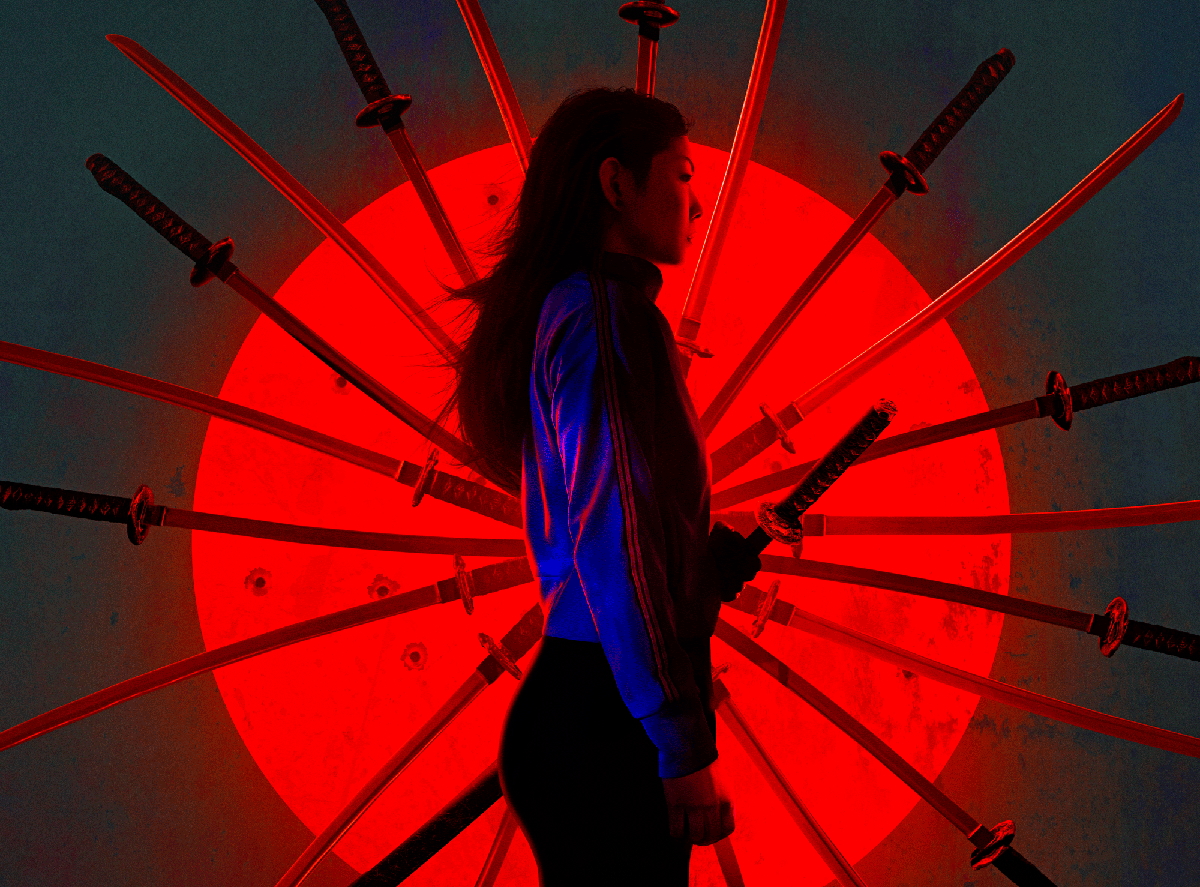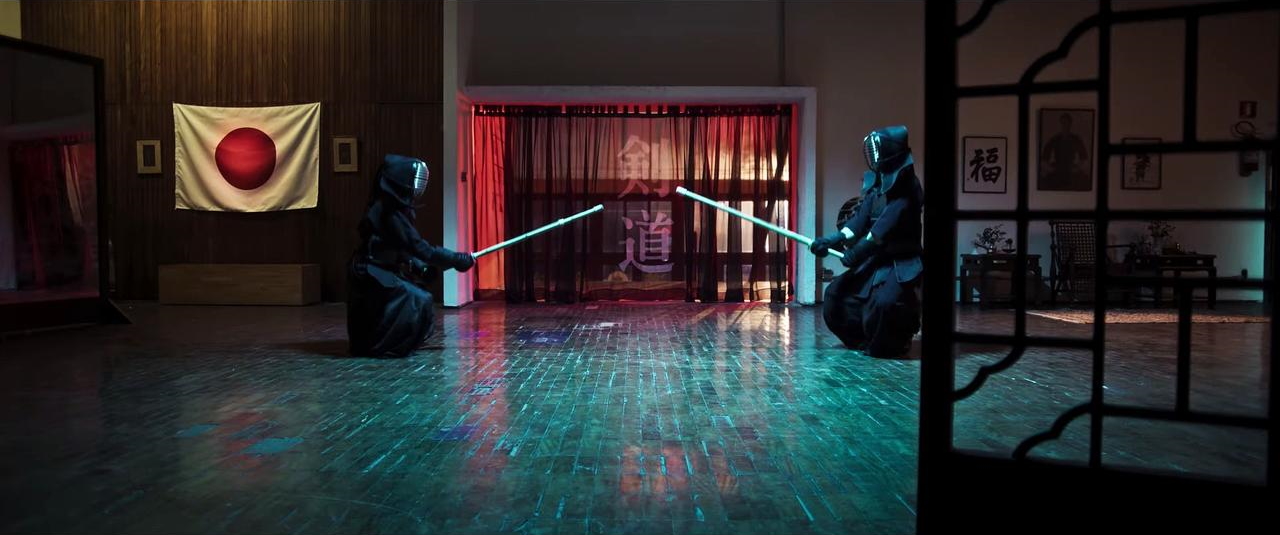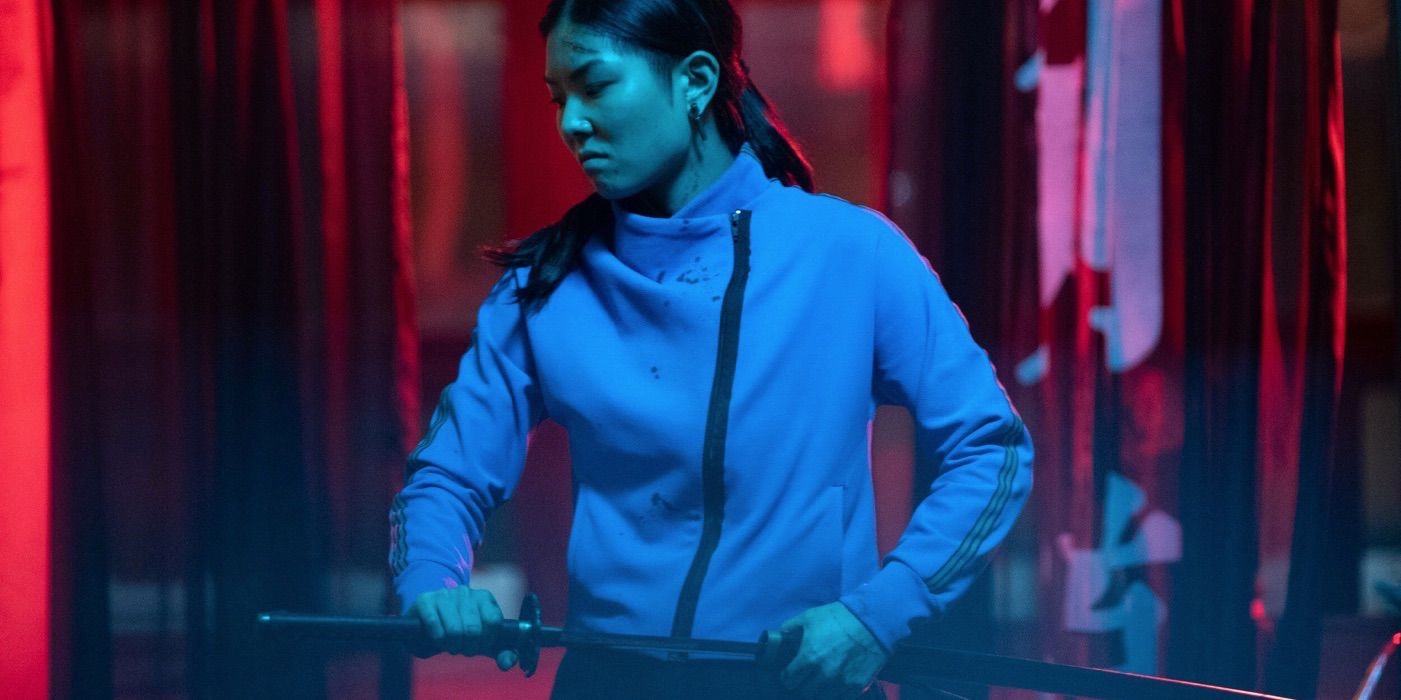
There is probably no better place to start discussing Yakuza Princess than with its setting of Sao Paulo, Brazil. As the film quickly points out in its introduction, Sao Paulo has the largest concentration of individuals of Japanese descent outside of Japan. Centered around the Japanese community in the Liberdade neighborhood, there are estimated to be over 1.6 million Japanese-Brazilians living in the city. With this as a backdrop, director Vicente Amorim is able to weave an enjoyable action-packed but satisfyingly layered narrative that gives viewers an interesting look at the intersection of two different cultures.
In the film, we follow Akemi (MASUMI), a young Japanese woman raised in Sao Paulo by her grandfather with little memory or knowledge of what happened to her parents. While seeking her own place in the world, she also continues her training since childhood in the way of the sword by her mentor Chiba (Toshiji Takeshima). Meanwhile, a grievously wounded man (Johnathan Rhys-Meyers) wakes up in a local hospital with amnesia, and the only clue to his identity rests with the katana that was found next to his body. The sudden and mysterious death of Akemi’s grandfather places both on the path towards uncovering the truth of their past as the criminal underworld threatens to boil over into complete chaos.
It is a very basic plot in the scheme of action flicks based around crime organizations. Chances are that if you have seen many yakuza flicks before and there won’t be any surprises to be had here, but that also isn’t really a problem. Action films don’t need to particularly break the mold in storytelling so much as the actual execution and style of their presentation. Yakuza Princess is also elevated just a bit further by its unique setting. I am not ashamed to admit that I was not aware of the Japanese population in Brazil, and it is not only compelling to see that brought to film but also very refreshing to see the overlap between the two cultures. The film keeps it mostly subtle, showing us what life is like in the Liberdade neighborhood rather than over-explaining, fitting nicely with its core focus as an action film first and foremost.
The story is based on the graphic novel Samurai Shiro by Danilo Beyruth. Unfortunately, it currently does not appear to have any sort of release outside its original language, so anyone hoping to seek the source material after the film will be left wanting. It would be excellent to see it receive a wider release in light of its cinematic adaptation. Still, with a comic as the backdrop, you can tell how it influenced the visual design of the film. Though the comic used black-and-white art, summoning the vibe of Akira Kurosawa’s many classic samurai epics, Yakuza Princess is washed in vibrant colors illuminating the generally dark overcast of the film. A lot of the framing in certain shots just bleed with a comic book aesthetic almost feeling like you could pull the frame and paste it in as the panel on the page.
The action is, of course, important to consider and the film manages to deliver a very enjoyable experience. While there is plenty of gunplay given the yakuza angle, much of the fighting ends up being close quarters and overall, I found a lot of the fight choreography to be quite excellent. They make some interesting choices again with framing scenes as well. When Akemi is practicing with Chiba in full kendo gear, we get a lot of POV shots from behind the protective mask that gives a very cool vibe. There is also a pretty extended chase sequence that eventually leads to some parkour across the rooftops. Additionally, much of this is well shot without an overreliance on quick cuts, meaning that you can actually see a lot of the action realized in full.

The strange katana also plays a rather interesting role in the film. While many of the revelations about Akemi’s past are best left discovered alongside her as the story unfolds, the weapon central to the mystery carries a powerful legacy. As our protagonists eventually learn, the katana is one of the many forged by the legendary swordsmith Muramasa. Sengo Muramasa was an actual historical figure living during the Muromachi period (14th to 16th centuries) of Japan. Famed for the fine craftsmanship of his blades, his reputation became somewhat tainted as his swords became associated with various movements against the Tokugawa shogunate of the time. In later generations, this morphed into folklore and popular culture as the idea that the blades Muramasa forged held some sort of evil within.
If you are familiar with a lot of Japanese media then it is highly likely at some point you have already encountered a depiction of Muramasa or his craftsmanship before. There was even a video game bearing the name created by Vanillaware solely focused on a fantastical take on the legend. Often depicted as demonic swords that possess their bearer to become savage killers, or cursed blades that thirst for blood by any means and even driving their bearer to commit suicide if they will not kill to satiate it. They recount much of the exaggerated legends throughout the film and it was a fun inclusion tying the film to have roots in Japanese history despite the primary setting. There is also an interesting bit of sound design, too, as when the blade is drawn, there is a sort of humming resonance that chimes out which sometimes overwhelms the audio mix.
Speaking of those connections, the final key character in the story is Takeshi played by Tsuyoshi Ihara. Veterans of samurai flicks will likely recall Ihara from his role in Takashi Miike’s 13 Assassins. Takeshi works as a prominent underboss to a yakuza clan based in Osaka, but he carries a dark secret tied to Akemi’s missing past. The character is well played by Ihara and well-formed in his role for the story as we are never quite sure whose side he is on. Early on we see him casually dispatching his own men with no remorse. After learning of Akemi’s existence, Takeshi goes rogue and comes to Sao Paulo to seek her out. It is amid the chaos of his pursuit and the sudden push by various criminal organizations to kill or capture Akemi that sets our leads into a flurried rush about the city following the breadcrumbs left by her grandfather to find the answers for this chaos.
Central to it all is Akemi’s past and the legacy that has been left to her. Though the action is still center stage, the film does spend some time ruminating on the concept of identity and whether people are bound to the legacy of their heritage or have the ability to pick their own place in the world. Just before the climax, she debates with Takeshi about the warring yakuza factions that lie behind everything and her own supposed fate. Akemi’s characterization is very refreshing in this regard. While watching her train with Chiba we see her fail and become frustrated. It seemed to me that in the wrong hands Akemi could have just been another silent master katana-wielding badass, but instead she is a surprisingly well-realized and layered character.
Akemi is a very skilled martial artist and we do see her kick plenty of ass across the runtime of the film, but she also makes plenty of mistakes, and not every fight goes her way. Before the action ramps up to the max, we get to see her life in Liberdade working a throwaway retail job, going out for drinks, and enjoying karaoke with a friend. These scenes manage to humanize her as a character quite a bit. Ultimately, it makes her growth and decisions later in the film matter that much more. It is a subtle thing, but this is the type of execution that makes the difference between just a dumb fun action film and something that carries a little more weight to its narrative.
The film is not without some hangups, however. There is a chapter during the middle of the that I found pulled me out of the experience quite a bit. Following the trail, Akemi and the amnesiac (who is later dubbed Shiro) wind up at a remote area run by people with a close connection to her grandfather. The film pumps the brakes hard at this moment and things slow down considerably. This, however, does have its enjoyable segments like Shiro being taught the ways of the samurai by two old guys as they watch black-and-white samurai flicks. It is also important to eventually unravel the mystery since that is central to the plot.

However, I really felt like this segment could be trimmed down some. There is just a little too much going in circles with people saying they can’t reveal anything or that they only know a part of the truth. Though respectfully, I am not sure I can say what I would have liked to see instead. Going too far in the other direction can lead to awkward dumping of exposition that rings hollow, but it was the one moment where I found myself reluctantly checking the run time. I doubt I could have come up with anything better, but it felt like it was worth noting.
While the comic book background gives a ton of support to the film in its style and execution, I also felt that those same elements hampered the ending a little. Although the mystery gets fully revealed and there is a resolution with the primary antagonist, the film suffers a bit from the feeling of being a comic book origin tale. There is clearly more story to be told and the last moments definitely have a “this is only the beginning” vibe to them. Maybe that is just being loyal to the source material, but it did make the experience seem much less stand-alone and defined. Ultimately, that is a pretty minor complaint in my book. I do hope there is a sequel at some point. Yakuza Princess lays some incredibly strong groundwork and to see Akemi and Shiro’s journey continue would certainly be a worthwhile experience.
Ultimately, Yakuza Princess is pretty standard fare for its genre. However, its unique look at the intersection of two cultures in a way that has rarely had a presence in film and rock-solid execution across the board in every aspect elevates the material to be something worth seeking out and experiencing whether you are a diehard fan of yakuza flicks or just an action movie junkie. Akemi is a very refreshing take for a lead in this sort of story and we can only hope that one day we will see the next chapter in her journey as she continues to defiantly carve her own path between fate and the legacy she has been burdened with.
Yakuza Princess was screened as part of the 2021 Fantasia Film Festival. The festival runs virtually from Aug. 5 – 25, 2021.

More from Fantasia Film Festival:
Psychic Vision: Jaganrei is a 1988 Japanese faux-documentary/supernatural found footage horror film written by Chiaki Konaka and directed by Teruyoshi Ishii. Beginning his career in 1986 with the horror comedy…
Celebrate renowned Hong Kong action classics, storytellers, and film icons with Shout! Studios’ new home entertainment series HONG KONG CINEMA CLASSICS™ Cult favourite HK movies, Hard Boiled (1992), City on…
SEVERIN UNLEASHES TWO MORE HUGE RELEASES FROM RUSS MEYER’S BOSOMANIA! WITH MOTORPSYCHO & UP! ‘Great to see Russ Meyer’s movies getting the treatment they deserve from Severin Films…. scanned in…
Gakuryu Ishii, director of such cult classics as Electric Dragon 80000v and The Crazy Family takes on the 1973 novel “The Box Man” by Kōbō Abe (Woman in the Dunes),…
Black Mandala in co-production with Urban Achievers S.A., led by René Ruiz Díaz, is proud to present “THE RED BOOK RITUAL: GATES OF HELL”, a chilling movie directed by Hernán…
Born in Queens, New York, in 1970, Tina Krause is an actress, writer, and director best known for her extensive work with W.A.V.E. Productions and other similar shoestring-budget independent producers….
In the sun-bleached stillness of Brookehaven, a rural town that feels both timeless and suffocating, two strangers form a fragile but radiant bond. What I Remember is the debut feature…
Wings of the Abyss is a 2025 Japanese crime thriller written and directed by Yuki Kobayashi. The director is known for the action thriller Kamikaze Cowboy (2015), the comedy-drama Death…
Tired of the same old popular picks? Ready to challenge yourself with titles that dare to be different? We’ve handpicked eight groundbreaking anime experiences that critics and casuals alike have…
A camera crew follows police officers Paul Massaro and Terrence Williams as they navigate a chaotic Halloween night in the small city of Franklin. Dealing with minor disturbances, they slowly…
Dustin is a potentially overqualified office worker who has a lifelong love and fascination with Japan and all things Horror. With a bachelor’s in English Literature and a master’s in Library Science, he devotes way too much time to researching and thinking critically about the media he enjoys. When not celebrating trashy horror films, anime, and idol music, he can be found raving about all things genre cinema as a co-host on Genre Exposure: A Film Podcast or indulging a passion for storytelling through tabletop roleplaying games.